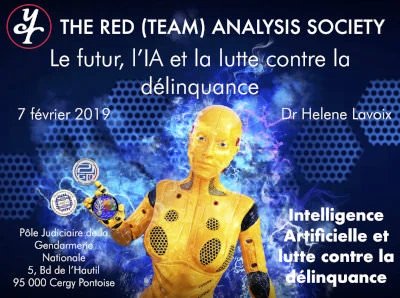Founder and President
Bio

Dr Helene Lavoix is the President/CEO of The Red Team Analysis Society and its founder. She holds a PhD in Political Science and a MSc in International Politics of Asia (distinction) from the School of Oriental and African Studies (SOAS), University of London, as well as a Master in Finance (Grande Ecole, France – valedictorian).
Dr. Lavoix brings together a wealth of research and academic expertise, enhanced by significant practical international experience. Having lived and worked in five countries—France, Cambodia, the UK, Belgium, and Singapore—she has also engaged in professional missions to fifteen additional countries, further enriching her global perspective.
She is an expert in strategic foresight and early warning notably for national and international security issues. She has over 15 years experience in both methodology and practice of strategic foresight and warning and over 25 years experience in international relations and related issues. She constantly works to improve strategic foresight and early warning analysis methodology, including potentially with AI.
She trains high-level decision makers and professionals through custom-made training courses on strategic foresight and early warning for various organisations. Since 2020, for example, in the framework of EU programs through CIVIPOL and EXPERTISE FRANCE (Projet de Soutien à la lutte contre le terrorisme en Tunisie II, then READ, CT-JUST), she has trained and supported high-level officers in Early Warning for the Ecole Supérieure des Forces de Sécurité Intérieure (ESFSI) of the Home Ministry of Tunisia, for the Pôle Sécuritaire de lutte contre le terrorisme et le crime organisé of the Home Ministry, and for other offices of the ministry, as well as, for the Institute of Leadership of the ENA Tunis. Formerly she did training for organisations such as Vesalius College in Brussels 2013-2021, the Geneva Center for Security Policy, the Royal Military Academy of Belgium, etc. She also taught global risk analysis / strategic foresight and warning in universities, at Master level (e.g. 2015-2021 for the Master in International Security at SciencesPo-PSIA in Paris, 2010 and 2011 as Visiting Senior Fellow at the RSIS, NTU in Singapore).
She also carries out studies and reports both in the field of strategic foresight and early warning and in geopolitics, international relations and politics. As expert and consultant (individual contractor), for example in 2022, Dr Lavoix researched and wrote an in-depth report on Ukraine for the UN OCHA.
She speaks at workshops and public conferences and publishes on anticipatory matters, from methodology to specific issues (e.g. methodology of strategic foresight, scenarios, indicators, timeliness, planetary limits and geopolitical issues, the COVID-19 pandemic, artificial intelligence, governance and international security, quantum information science governance and international security, fragile states, the Islamic State, the Syrian conflict, social unrest and mobilization, war, genocide, energy security, extreme environments, etc.).
Prior to that, as an independent researcher, she has advised institutional actors and researched commissioned reports. She served as Senior Scientific Advisor to the Global Futures Forum (a multinational partnership of intelligence and security organizations at unclassified level), after having been the coordinator of the GFF SF&W Community of Interest 2008-2011 and lead of the corresponding online community 2007-2008. She also worked as contractor for the U.S. Department of Energy on global environmental change and energy security (2008-2009).
Previously, she served as an analyst in International Relations (Eastern Asia and Globalisation) for the European Commission, created and headed in Phnom-Penh the Cambodian branch of a NGO in the field of Development and worked in finance, as treasurer.
Some Speaking Engagements
Unsustainability, planetary boundaries and geopolitical stakes for Alterre Day, Alterre Bourgogne-Franche-Comté, 21 January 2022.
What will be the key technologies of the future? for ISG – Groupe Enedis, France, 6 January 2020.

Tailor-made presentation, researched and designed specially for the Judicial Pole of the French Gendarmerie Nationale on Artificial Intelligence, the Future and Combating Crime”, 7 February 2019, France
SciencePo- PSIA: “Managing a Nuclear Disaster“, 5 Dec 2018: Commentary.
International Conference on Quantum Computing (ICoCQ), France, Ecole Normale Supérieure, Paris, 26 to 30 November 2018: “The Quantum Battlefield and the Future“, Concluding keynote.
RESO-COM, Digital Security et Identité, Mars 2018 – Keynote: “L’IA et la géopolitique“.
3rd ARF (ASEAN Regional Forum) Seminar on Preventive Diplomacy, Mediation and Early Warning Systems, co-chaired by the Republic of the Union of Myanmar, the European Union and the United States, Yangon, 19-21 June 2017: “Early Warning Systems“
Swiss Confederation/OECD – Fourth Workshop on Strategic Crisis Management “Anticipating crises and their potential pathways”, Geneva, Switzerland – 28-29 May, 2015 – Keynote speaker “From weak signals to crisis scenarios”
International Relations Studies Association – TUIC– Turkey-Balkan Economy Summit, Istanbul, Turkey, 11 – 12 April 2015 : “Enlarging the Shadow of the Future” – Improving Cooperation between Turkey and the Balkans and Sustainable Development
Vesalius College – Brussels – Global Risk Analysis & Crisis Management Executive Course – Senior expert round-table, 25 October 2013: “Analysing Risk, Preparing for Uncertainty“
IFRI – AXA fund for research: Workshop “Global political risks” 14 October 2013, Paris: “Introduction to Early Warning systems: process and challenge”.
Einiras and SciencesPo Paris, “How to face change? Understanding the Past to Foresee the Future – Implications for information retrieval and sharing”, 21st Annual Einiras Conference, Changing Information Landscape in a Difficult Economic Situation, (on invitation only) -10-11 December 2012, Paris.
Canadian Association for Security and Intelligence Studies (CASIS)/Association canadienne pour les études de renseignement et de sécurité (ACERS),– “Strategic Foresight & Warning: process & analytical methodology to explore new frontiers in Security and Intelligence” 2011 International Conference – Ottawa – November 2011.
Délégation aux Affaires Stratégiques, Ministère de la Défense “What makes foresight actionable?” – Paris – May 2011.
RSIS Public Lectures Series, “Strategic Foresight and Warning in a complex world,” NTU – Singapore – February 2011
Civil Service College, Singapore, “Anticipating Strategic Surprises: An Introduction to Strategic Foresight and Warning,” CGL (Centre for Governance and Leadership, Managing in Complexity Series – January 2011.
US Department of State, Homeland security, National Defense University, – “What makes foresight actionable?” Actionable foresight: Strengthening the Linkage between Longer-Term Analysis and National Security Decision-making – workshop II (on invitation only)– Washington DC – January 2011.
RSIS Public Lectures Series, “Why Strategic Foresight and Warning? The case of Energy Security” – NTU – Singapore – April 2010.
European Commission (RELEX), Talkshow “Enhancing Early Warning with Open Source Intelligence” Making the Difference – Conference –- Brussels – June 2009.
European Commission – Club of Budapest (on invitation only), “Strategic Energy Security, some elements on demand” – Budapest – June 2009.
European Commission – Club of Budapest (on invitation only) – “Early Warning: contemporary challenges” – Bucharest, February 2009.
Canadian Association for Security and Intelligence Studies (CASIS)/Association canadienne pour les études de renseignement et de sécurité (ACERS), “Strategic Early Warning: Comparing Ways and Means” – 2007 International Conference – Evolution, Revolution or Same Old, Same Old? Reality Check on Security, Intelligence, Law Enforcement and Defence in 2007 – Calgary – September 2007.
Some publications
She is the author, among other publications notably for the Red (Team) Analysis Society, of “Ensuring a Closer Fit: Insights on making foresight relevant to policymaking”, Development (2014) 56(4); “What makes foresight actionable: the cases of Singapore and Finland” (confidential commissioned report, US government, November 2010), “Enabling Security for the 21st Century: Intelligence & Strategic Foresight and Warning” RSIS Working Paper August 2010, (co-author) “Cultivating Strategic Foresight for Energy and Environmental Security“, Environmental Practice, Volume 11, Issue 03, September 2009, “Constructing an Early Warning System,” in From Early Warning to Early Action, European Commission, ed. DG Relex, 2008, “Detailed chronology of mass violence – Cambodia (1945 – 1979),” Online Encyclopaedia of mass violence, 2008 and the editor of Strategic Foresight and Warning: Navigating the Unknown, ed. RSIS-CENS, February 2011. More on academia.edu. Listed on the public list curated by LSEImpactBlog: @LSEImpactBlog/soc-sci-academic-tweeters.
Some foresight and warnings
- 1987: China as one of the most important future economic and political players (Master dissertation – MFin)
- 1993: Warning the French and European diplomatic community in Cambodia that to promote a double prime-ministership would entail most probably a coup (it occurred in 1997) and potentially related civil disorders, to the least a slow down of the recovery process.
- 1998: Identification of deep-sea resources as future geopolitical issue.
- 1999-2000: Internal lobbying within the analysis and policy planning units and related directorships of the European Commission DG1 & DG Trade to see defence and international relations considered in an inter-connected way alongside trade and the launch of the Euro.
- Since 2008, among other:
- Warning about connected highly likely political consequences worldwide of the financial and economic crisis.
- Warning about the need to revisit demographic foresight and forecast to include multi-feedbacks.
- Since 2009, among other:
- Lobbying for developing global efforts in terms of strategic foresight and warning regarding the future of the modern state and associated system with at its core the crucial problem of public deficit. This is THE key that will condition the possibility for answering – at national, international, regional and global – any other pressure or threat.
- Warning about the need to pay attention and invest in “space resources.”
- Since 2013, read The Red Team Analysis Society for public foresights…

